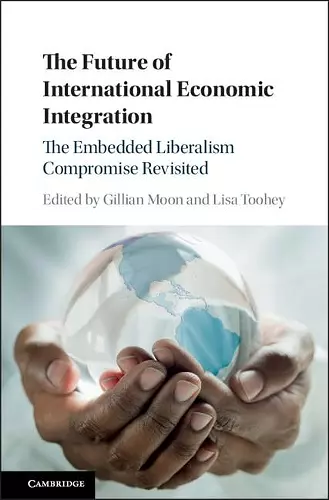The Future of International Economic Integration
The Embedded Liberalism Compromise Revisited
Gillian Moon editor Lisa Toohey editor
Format:Hardback
Publisher:Cambridge University Press
Published:27th Sep '18
Currently unavailable, and unfortunately no date known when it will be back

Responds to current world events and offers 'a rich resource for initiating new conversations about potential futures for the trade regime'.
World events such as the financial crisis, Brexit, and the election of President Trump have all brought new challenges to the existing trade regime and called into question fundamental assumptions. This book explains the context of current events and the renewed possibility for an inclusive trade and economic agenda.As part of the 1947 General Agreement on Tariffs and Trade (GATT), a compromise on domestic socio-economic issues was struck and subsequently given the name 'embedded liberalism'. The Future of International Economic Integration explores the multiple dimensions of the embedded liberalism compromise, to understand its contemporary influence on both the scope and application of international trade law, and on the content and character of parallel domestic socio-economic policy space. Top international economic law scholars have contributed chapters that look at the four principal dimensions of the topic. It sets out the history and character of the embedded liberalism compromise, explores the relationship between the compromise and WTO law, explores areas of contemporary tension that invoke the principles of the compromise such as human rights, cultural diversity, and environmental protection, and investigates what future impact the compromise might have on new trade and investment agreements.
'This excellent volume does much more than excavate the underlying principles of the post-World War II international trade regime. It also demonstrates precisely how these principles went askew in the most recent wave of globalisation. Most importantly, it addresses how deep reflection on the principles can offer insights into ways of strengthening the fragile 'system' of global economic governance today.' John Gerard Ruggie, Berthold Beitz Professor in Human Rights and International Affairs, John F. Kennedy School of Government, Massachusetts
'This is an excellent set of essays on the continuing vitality of some of the architectural assumptions in the design of modern international economic law. The essays cover numerous issues including trade, investment, food security, cultural sensibilities, human rights, and the workplace.' Steve Charnovitz, George Washington University Law School, Washington DC
'There is a pressing need for sustained and thoughtful discussion about how the international economic system can best serve the interests of a wide range of social and human rights issues and maintain the necessary balance between economic openness and domestic socio-economic stability. This book provides an insightful contribution to that debate in curating the work of some of international economic law's innovative and leading academics, and offers a much needed perspective and way forward for international economic law in testing times.' Gabrielle Marceau, University of Geneva, President of SIEL and Senior Counsellor, WTO Legal Affairs Division
'History is full of ironies; we live in a time when the rule of law and embedded liberalism is under threat from policymakers in two of the countries that designed the longstanding mix of domestic and international trade policies that has kept economic peace and stimulated economic growth. This important edited volume by Professors Gillian Moon and Lisa Toohey rethinks the embedded liberalism concept and reminds us why it deserves both our understanding and support today.' Susan Aaronson, George Washington University, Washington DC, and Senior Fellow, Centre for International Governance Innovation
ISBN: 9781316510179
Dimensions: 235mm x 156mm x 18mm
Weight: 490g
266 pages